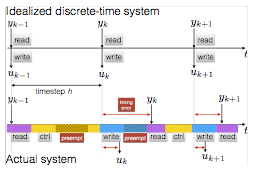|
"Online Optimization for Output-feedback Control." Invited
talk at the Electrical and Computer Eng. Department, Univ. of Texas,
San Antonio, Apr. 2019.
"Estimation in Cyber-Physical Systems Under Attack." Plenary
talk at the Conference on Decision and Game Theory for Security
(GameSec'18), Seattle, Washington, Oct. 2018.
"Real time optimization for estimation and control." Invited
Opening Tutorial Session at the 56th Annual Allerton Conference on
Communication, Control, and Computing, Monticello, Illinois,
Oct. 2018.
"Noncooperative Game Theory." Invited high-level course at the
Brazilian Automation Congress (CBA), Joao Pessoa, Brazil, Sep. 2018.
"Optimization-based Control." Plenary talk at the
Brazilian Automation Congress (CBA), Joao Pessoa, Brazil, Sep. 2018.
"Fast Real-Time Online Optimization for Output-feedback
Control." Invited talk at the IFAC Workshop on Networked \&
Autonomous Air \& Space Systems (NAASS'18), Santa Fe, New Mexico,
June 2018.
"Autonomous Systems for Safety Critical Applications." Plenary
talk, Workshop on Cognizant Autonomous Systems for Safety Critical
Applications (CASSCA) sponsored by the Institute of Navigation
(ION), Reston, Virginia, Jan. 2018.
"Randomized Methods in Game Theory with Applications to Network
Security." Pleanary speaker at the 6th Midwest Workshop on Control
and Game Theory, University of Michigan, Ann Arbor, April 2017.
"Opportunities and Challenges in Control Systems arising from
Ubiquitous Communication and Computation." Invited talk at the
Design of Robotics and Embedded systems, Analysis, and Modeling
Seminar (DREAMS), University of California, Berkeley, Sep. 2016.
"Addressing Adaptation and Learning in the Context of MPC and MHE." Invited talk at the Workshop on Recent Advances and Future Directions on Adaptation and Control, Chicago, Illinois, July 2015.
"The Next Internet: Risks and Rewards with the Internet of Things." Panelist at the Central Coast MIT Enterprise Forum, Santa Barbara, CA, Feb.2015.
"Opportunities and Challenges in Control Systems arising from Ubiquitous Computation and Communication." Keynote talk at the 2014 IEEE Int. Conf. on Control and Automation (IEEE ICCA), Taichung, Taiwan, June 2014 and at the at the 1st Multi-symposium on Control Systems (MSCS2014), Tokyo, Japan, Mar. 2014.
| 